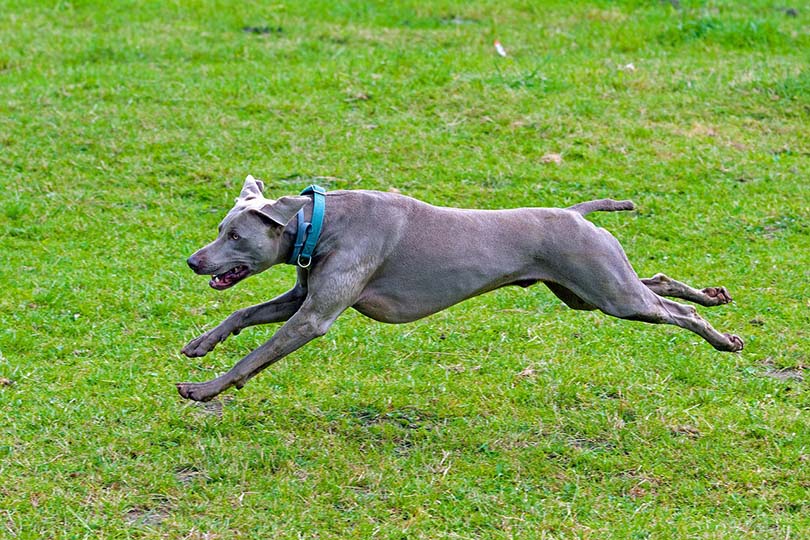
Click Below to Skip Ahead
The origin of the Weimaraner began during the 1800s in Germany,1 with the Grand Duke Karl August who was a keen sportsman in the town of Weimar. He decided he wanted to create the best hunting dog and crossed Bloodhounds with French and German hunting dogs to create the Weimaraner. The duke and his friends used these early Weimaraners to hunt big game, such as wolves. Later, the Weimaraner was used to retrieve game birds and assist in other hunting activities.
Breed Overview
Height:
23 – 27 inches
Weight:
55 – 90 pounds
Lifespan:
10 – 13 years
Colors:
Silver gray, blue, gray
Suitable for:
Active families, owners with yards
Temperament:
Intelligent, loyal, stubborn, playful, protective, easy to train, high-energy
The breed was a secret for many years in Germany, but the dog eventually came to the United States during the 1920s. By the 1950s, they were a popular pet with many celebrities, such as Grace Kelly, helping to make a name for the breed in the U.S.
The Weimaraner is known for being a loveable, energetic family dog, and for good reason! The Weimaraner makes a loyal, intelligent, and protective family pet for those looking for a constant companion. They are high-energy, require exercise every day, and tend to do well in training because they want to please their owners. The Weimaraner is a well-behaved family dog for those willing to properly train this highly energetic dog.
Weimaraner Characteristics
Weimaraner Puppies

Some breeders will start vet care for the puppies, which can include first vaccinations, deworming, and, in some cases, microchipping. Many breeders also start socializing puppies as part of their early training so they can adapt to new people and environments. Your puppy will likely come from purebred parents that are registered with the American Kennel Club, so that might make the price of your puppy higher. If your puppy comes from purebred parents, you may also be able to register your puppy with the AKC, so check with your breeder to see if that’s a possibility.
Weimaraner are easy to train but they can be stubborn so you will need to make sure you have the time to properly train them. They have huge amounts of energy so if you are considering this breed and you have a home with a large yard, then your new pup will be happy.
Temperament & Intelligence of the Weimaraner

The Weimaraner is a sporting dog that needs an energetic family to keep up with it. They always want to be part of the crowd and will happily join the family in any activity from hiking to running to a family nap. They do well with children and want to spend all their time with their family, which can lead to separation anxiety if they are left alone for long periods. They are very intelligent and will excel at training because they always want to please their owners. Read on to learn more about this smart and energetic breed so you know what to expect before you bring home a puppy to your family.
Are These Dogs Good for Families? 👪
The Weimaraner is extremely loyal and protective, so they make good family dogs. Weimaraners do well with kids, especially older children, that can play games and run around outside with them. They bond with their families and want to spend all their time with you. They will develop separation anxiety if left alone for too long and may become destructive, or bark excessively, due to their anxiety. Proper training will likely help with this issue, so if it becomes an issue, contact a trainer right away.
Does This Breed Get Along with Other Pets?
The Weimaraner usually gets along well with other pets, particularly dogs, but they should be introduced slowly so both dogs have time to adjust to each other. The Weimaraner can display separation anxiety characteristics, so bringing a second dog into the home may help your pup feel less lonely when the family is out and about with it.
One thing to remember about the Weimaraner breed is that they were bred to be hunting dogs and have a high prey drive. Their hunting instincts may lead to them chasing cats or small dogs that live in the home. Early socialization and training will help to curb this drive, but it may need to be addressed with additional training throughout their life.
Things to Know When Owning a Weimaraner:
The Weimaraner is a great family dog, but there are some other things to consider before bringing one home to your family.
Food & Diet Requirements 🦴
The Weimaraner is a high-energy dog and will need to eat the right amounts of quality kibble to stay at peak health. They are ravenous eaters and will quickly polish off any food set before them, so it will be important to pick high-quality food that meets all the nutritional requirements of your new pet. Once you pick out your kibble, feed your dog according to their weight and the package directions. If you’re uncertain about what food to give your new pet, ask your veterinarian for some recommendations for quality food.
Exercise 🐕
The Weimaraner is a high-energy dog and will need to exercise daily to stay healthy and to prevent boredom. They enjoy a good walk, but they do prefer running as a form of exercise to keep in shape. The Weimaraner’s high exercise needs are why this breed of dog usually does better in homes with yards rather than apartments. Remember, they can become destructive if they are bored or experiencing separation anxiety, so a run a few times a week will help keep your pup happy.
Training 🎾

Weimaraners are incredibly intelligent and learn quickly, often excelling in training courses because they love to please their owners. Puppies will need to be entered into puppy training and stay in training as they age so they become well-mannered citizens of society. Their smarts can get them into trouble because they are curious and may end up getting into mischief. You will need to be consistent with your training commands and expectations and they may need additional training as they age to resolve any issues that may arise.
Grooming ✂️
The Weimaraner has a short coat that sheds often, so this is not a low shedding bred. Make sure to brush your companion once a week to remove old hair and bathe your dog as needed to keep its coat shiny and healthy. Their ears will need to be cleaned at least once a month. Weimaraner nails tend to grow quickly, so it will be important to get your dog on a nail trimming schedule and stick to it. Shorter nails will be vital to helping your Weimaraner get the exercise it needs without any nail or joint issues.
Health and Conditions 🏥
The Weimaraner is a sporting dog and is healthy overall, but their high activity level means they often have accidents resulting in sprains, pulls, scrapes, and cuts. If your dog injures itself, take it to the vet right away to get checked out to make sure it’s not a serious injury.
A notable condition that affects Weimaraners is gastric torsion, which is when the stomach gets stretched out and can twist shut upon itself. This is a life-threatening condition, so ask your vet what signs you should look for to make sure your dog gets timely treatment. Here are some of the other conditions that may affect your Weimaraner as it ages:
Male vs Female
Potential new Weimaraner owners often want to know whether they should choose a male or a female puppy when it’s time to bring home their new pet. Male Weimaraners tend to be taller and heftier than their female counterparts, who lean toward being more petite (those couple of inches in height can make a big difference with this breed). Regarding temperament in the male versus female argument, male dogs can be more distracted, playful, and give more attention to their owners. Female Weimaraners, while affectionate, tend to be more independent.
3 Little-Known Facts About the Weimaraner
1. Weimaraners are Sesame Street stars.
If you’re wondering why the Weimaraner seems oddly familiar, you’ve likely seen him on Sesame Street. Starting in 1989, artist William Wegman began filming artistic video segments of Weimaraners for the popular children’s television show and the Weimaraner breed became a star.
2. These puppies have stripes!
If you get the chance to see a newborn Weimaraner, you’ll notice they have stripes, but these fade within a few days.
3. Have you heard about the Gray Ghosts?
Weimaraners are nicknamed the ‘Gray Ghost’ because they are sneaky and stealthy when they hunt.
Final Thoughts
The Weimaraner is an intelligent and protective breed, making for a loyal family companion. They are high-energy dogs and will need exercise every day to keep them healthy and to provide mental stimulation. They do well in households with a yard, or with owners that will take them along on their run. Weimaraners love to spend all their time with their families and may develop separation anxiety if they are alone for long periods, leading to some destructive tendencies. Professional training will help address any issue as it arises, but a second dog may also help resolve the issue, so the Weimaraner doesn’t feel alone when the family is away. If you’re looking for a loving, loyal, and high-energy dog to bring home to your family, a Weimaraner may be the right fit if you’re ready to put in the energy to help this beloved breed succeed.
Next on your reading list:
Featured Image Credit: cri92, Pixabay









